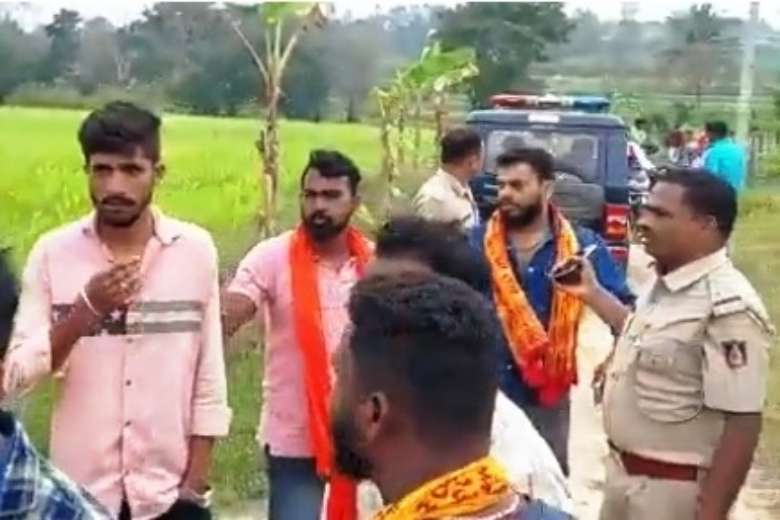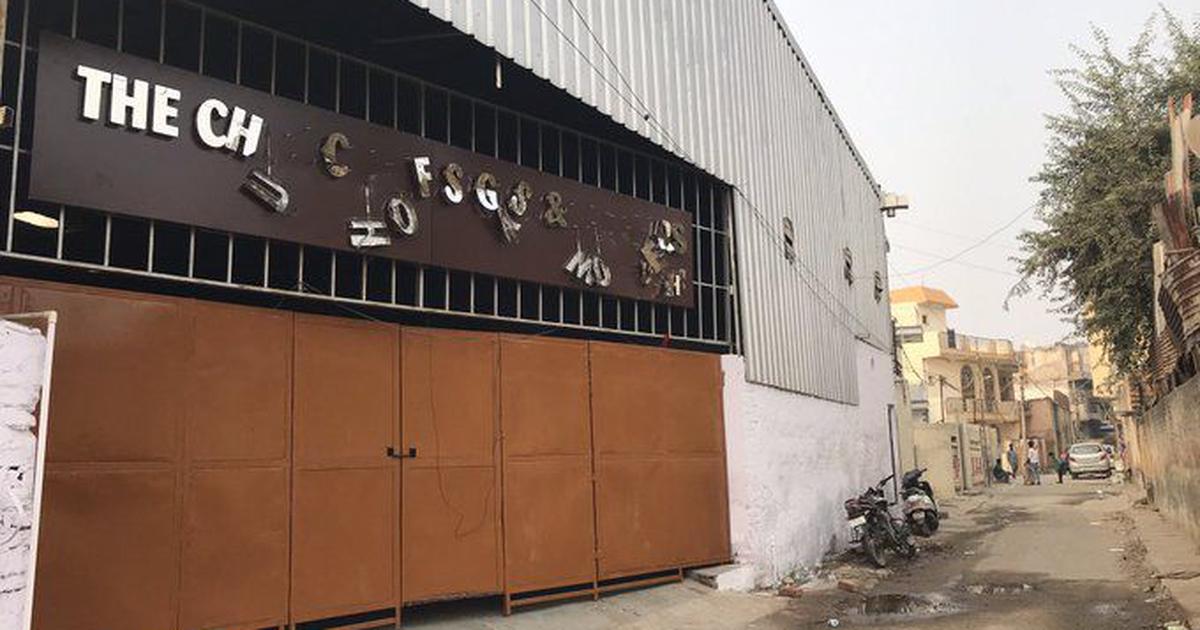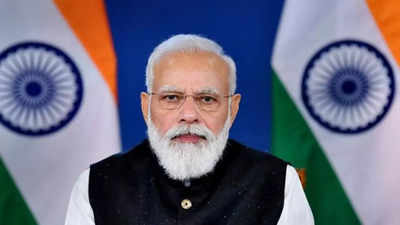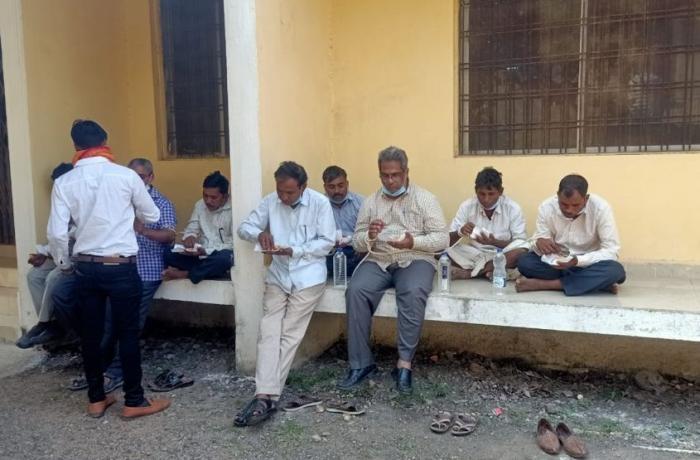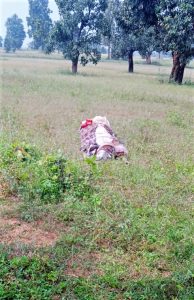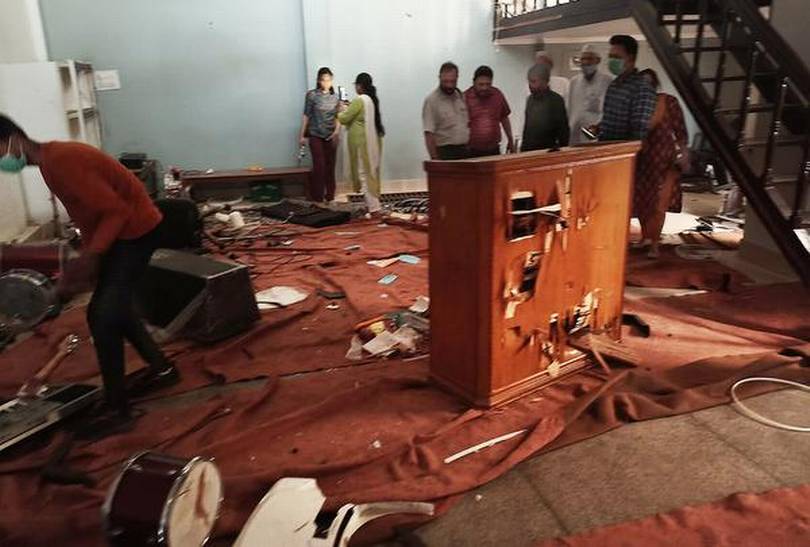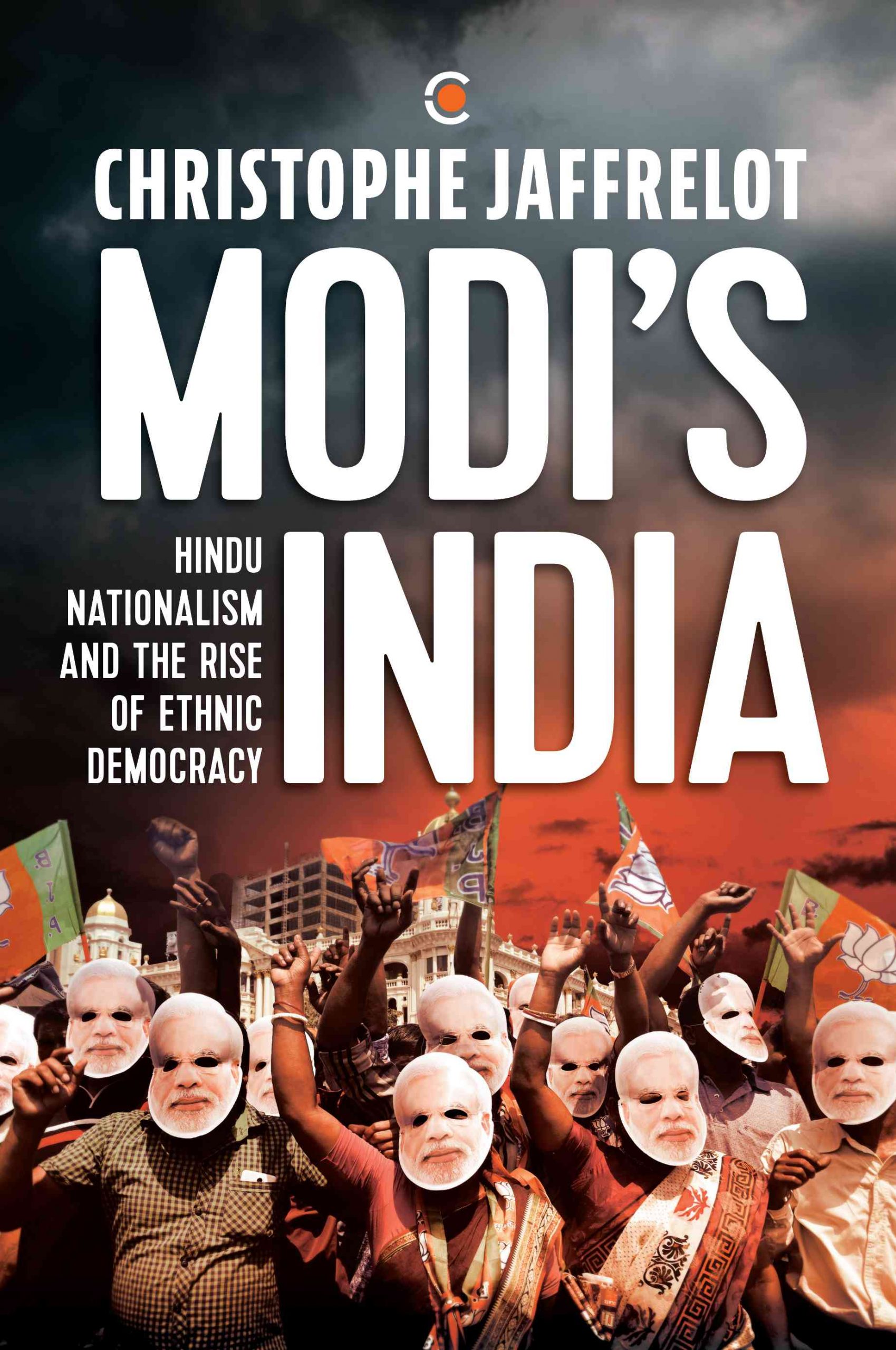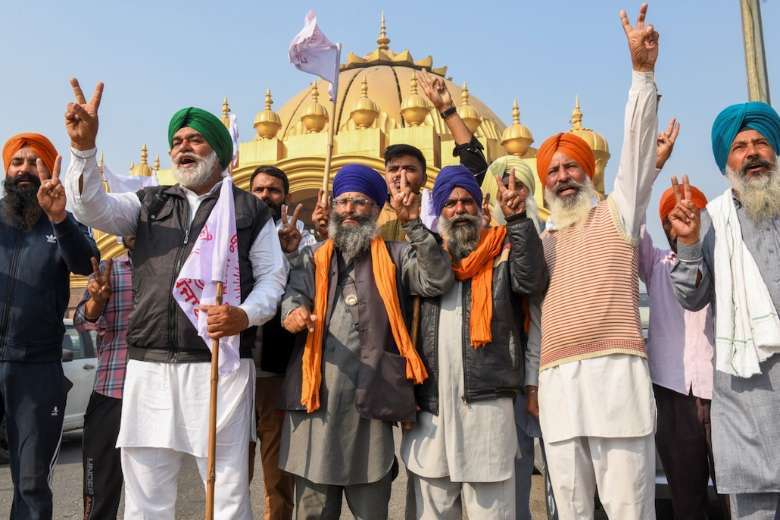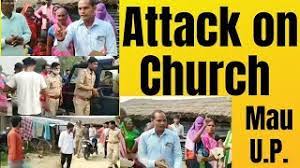Hindu activists intensify attacks on Indian Christian prayer meets
The repeated attacks hint at systematic targeting and official bias against the minority community Hindu activists in India are stepping up disruption of Sunday prayer services under the guise of exposing forced religious conversions. Two such incidents were reported on Nov. 28. In national capital Delhi, activists of Bajrang Dal (Brigade of Hindu deity Hanuman) vandalized a newly inaugurated church in the Dwarka area. Minakshi Singh, general secretary of Unity in Compassion, told UCA News: “The church was inaugurated on Tuesday and was holding its first Sunday service. It was started by Ankur Nirula Ministries based in Jalandhar.” Singh alleged the police were biased against the minority community. They merely detained one of the attackers for about an hour or so and let him go after questioning. News website The Quint quoted a police official saying: “We received information at 9.30am on Nov. 28 that a quarrel had broken out at Matiala Road and on inquiry it was found that a group of residents and local miscreants had vandalized the board that read ‘church’.” The official said the police have registered two reports of offense, one against those who vandalized the church and another against those present inside the church for violating the Delhi Disaster Management
Delhi: Church in Dwarka vandalised allegedly by Hindutva group members, one arrested
11/29/2021: The attack reportedly took place when the warehouse-turned-church was holding its first Sunday prayer. A warehouse-turned-church in Delhi’s Dwarka area was vandalised on Sunday allegedly by members of Hindutva group Bajrang Dal, reported the Millennium Post. The attack reportedly took place when the church was holding its first Sunday prayer. “Police received information at 9.30 am on 28 November that a quarrel had broken out at a godown-turned-church on Matiala Road,” a police officer told The Quint. “On inquiry, it was found that a group of residents and local miscreants vandalised the board that read ‘church’.” The police have registered two first information reports – one against those accused of vandalism for causing public nuisance and another against those present in the church for violating Delhi Disaster Management Act guidelines – at the local Bindapur police station. The guidelines prohibit large gatherings in view of the coronavirus pandemic. The Delhi Disaster Management has allowed religious places to reopen for devotees, but the warehouse-turned-church had not been designated as religious premises, a police officer told Millennium Post. One person has been arrested in connection with the vandalism, reported The Indian Express. “Some people had gathered at a warehouse where they had put a board with word
The rise of ‘Godi Media’ in the U.S.!
(This article was originally published in the Indian Panorama) There is an urgent need for honest journalism to speak the truth to power in India and within the Diaspora. The primary function of journalism is to connect, inform and educate the public. Unless the media stands firm and refuses to be stifled and intimidated, there is very little hope in preserving freedom and justice and demanding accountability from power centers. The Indian ethnic press in the U.S. bears an even bigger responsibility in creating open space and helping to stop the spread of division and hatred within the community. Anything less would be tantamount to a total abdication of their moral responsibility to the public!” In a recent exchange with a leading publisher of an ethnic Indian newspaper, I inquired why he hasn’t carried a news item on the Indian Americans protesting before the United Nations where Prime Minister Modi was addressing the General Assembly. The answer came swiftly back in a query whether the demonstration was anti-India! I responded in kind, saying protesting Modi policies does not constitute taking an anti-India stand. Unfortunately, that is the sad reality that the ethnic Indian media has fallen into. A respected journalist recently told me that management chastised him for inviting
16 pastors falsely accused of disturbing peace after 40-strong Hindu mob storms church
Sixteen pastors have been falsely accused of disturbing the peace because they met with an official regarding the case of another pastor who had also been charged with “disturbing peace” after radical Hindu nationalists attacked his church. Police filed a case against the 16 pastors on Nov. 13, the day they went to the local magistrate’s office in the southern Indian state of Karnataka for peace talks on behalf of the Christian community and Pastor Chandrakanth, who had been told to appear before the official that day, according to the U.S.-based persecution watchdog International Christian Concern which didn't disclose the exact location. On Nov. 7, about 40 radical Hindu nationalists had attacked Pastor Chandrakanth and his congregation during a worship service. After the mob stormed the worship hall, church members formed a human barrier between their pastor and the radical Hindus. “The congregation stood before me as a human fence,” the pastor was quoted as saying. “Otherwise, they would have killed me. The radicals want to wipe out Christianity from this area and they think it is easy under the BJP (Bharatiya Janata Party) government, presently ruling the state.” However, after the police arrived on the scene, they filed a case against Pastor Chandrakanth,
Hindu extremists storm Christian gathering in Jhabua, in the Central Indian State ruled by the Hindu nationalist party.
Violence against Christian gatherings are becoming routine in a Madhya Pradesh district. Hindutva-inspired militants held a rally calling for a ban on Christian meetings. “At the start of the Advent season, we are concerned for the Christian community in Jhabua,” said Sayan K. George. Bhopal (AsiaNews) – In Jhabua, a district in the Indian state of Madhya Pradesh, Hindu extremists are again putting more pressure on Christians. On Monday afternoon, militants inspired by Hindutva, a Hindu-centred nationalist ideology, held a rally with hundreds of activists "denouncing" alleged conversion activities among tribal people in some of the district’s rural areas. The incident comes after nine people were seized during an organised prayer in the village of Manpur on 10 December last year. As usual Hindutva activists broke into a building where the religious service was underway and called the police. A case was filed against the Christians under the state’s toughened up anti-conversion law. Pictures of the incident show Christians, their hands tied, held under guard by a Hindu nationalist activist. After they were taken to prison, they were released on bail. Now the rally has further heightened tensions. Hindu extremists handed a memorandum over to the local police superintendent and the local magistrate. In their 13-point petition,
Animist Villagers in India Force Christians to Exhume Body
11/24/2021: Tribal animists influenced by Hindu extremists in central India last month forced Christians to exhume the body of a 25-year-old man buried on relatives’ private land because they didn’t want a Christian interred in their village, sources said. Laxman Markam had been dead for two days when about 50 residents of different villages armed with axes and wooden clubs on Oct. 29 forced his Christian widow and brothers to exhume his body in Gumadpal village, in Chhattisgarh state’s Bastar District, said Methodist Church pastor Samson Baghel. “They demanded Laxman’s corpse be exhumed,” Pastor Baghel told Morning Star News. “When the family asked the crowd as to where should they bury Laxman then, the crowd told them to take it wherever they wanted, but that they would not let a Christian remain buried in the village.” The deceased’s brother, Sitaram Markam, said villagers claimed that ownership of the land where he was buried was disputed. After more rancorous objection and threats, the Christians were forced to exhume Markam’s body, and the villagers demanded that it be taken to Pastor Baghel’s village for burial 15 miles away. Pastor Baghel then called local police. Laxman’s corpse lay exhumed on the private land for hours before police arrived, the
Churches under attack: Uttar Pradesh reports most cases of anti-Christian violence across India
Read the original full article in FRONTLINE INDIA here. The Following is excerpts from the original article published in FRONTLINE Magazine: According to data available with the United Christian Forum (UCF) helpline, 305 such incidents have been reported this year in India. Uttar Pradesh fares the worst, with cases reported from cities and towns as diverse as Varanasi, the Prime Minister’s constituency, Prayagraj (Allahabad), Noida, Ayodhya, Rampur, Bahraich and Lakhimpur Kheri. The most recent of these attacks have been in Mau district in Uttar Pradesh and Roorkee in Uttarakhand. Said the activist John Dayal: “The common factor in Uttar Pradesh is that the anti-conversion law for Muslims includes Christians too. People come to churches wielding lathis, accompanied by a local photographer and videographer and often by the police. They disrupt the prayer service, beat up the pastor, and if it is in a building, they attack the building, desecrate the Bible, etc. As in Roorkee. The police are almost always mute witnesses although in Roorkee they did take action because the local people also acted. Even if the police register a case against the Bajrang Dal or the Hindutva brigade, a case is also filed against the victims, including pastors. The victim is
Christophe Jaffrelot on the way Hindutva is changing history and science textbooks in schools
An excerpt from ‘Modi’s India: Hindu Nationalism and the Rise of Ethnic Democracy’ published on Scroll.in. To read this article in SCROLL.IN where it was originally published please click here. In March 2018, investigative reporters revealed the existence of a committee tasked by the culture minister, Mahesh Sharma, to revise India’s history. This fourteen-member committee (including archaeologists, bureaucrats, and ideologues) was commissioned by the minister to produce a “holistic study of origin and evolution of Indian culture since 12,000 years before present and its interface with other cultures of the world.” The idea that the age of Hindu civilisation is three or four times greater than what has been established by contemporary historiography aimed to achieve two explicit goals. First, it was coupled with the persistent effort by Hindu nationalists to present their mythology as history. Mahesh Sharma himself told Reuters: “I worship Ramayana and I think it is a historical document.” And he added, in keeping with the tried-and-true method of strategic emulation, “If the Koran and Bible are considered as part of history, then what is the problem in accepting our Hindu religious texts as the history of India?” Second, uncovering evidence from ancient history aimed “to prove that today’s
Indian bishops welcome PM Modi’s U-turn on farm laws
Catholic leaders have hailed Indian Prime Minister Narendra Modi’s announcement to repeal three controversial farm laws that forced farmers to stage one of the country’s longest public protests in which close to 700 farmers died. “It is a really a very welcome decision in the interests of farmers and the nation as a whole,” said Bishop Alex Vadakumthala, chairman of the office of labor of the Catholic Bishops’ Conference of India (CBCI). Modi made his surprise announcement on Nov. 19 on the birth anniversary of Guru Nanak, founder of the Sikh religion. Many Punjabi farmers are Sikhs. The PM said the laws were enacted for the welfare of the farmers but added: “We haven’t been able to explain to our farmers. This is not a time to blame anyone.” Modi’s announcement came as farmers were planning to intensify their protest from Nov. 26 to mark the anniversary of their protest. Farmers from the northern state of Punjab launched the protest against the laws — the Farmers’ Produce Trade and Commerce (Promotion and Facilitation) Act, Farmers (Empowerment and Protection) Agreement of Price Assurance and Farm Services Act, and Essential Commodities (Amendment) Act — last November The farmers have since protested in New Delhi even after police blocked
Fact-checking the Illegal Religious Conversion Claims of Extremists in India
11/17/2021 – On Sunday morning, October 10, Vijendra Prasad was playing the Dolluck, an Indian leather instrument, as he joined 70 other Christians in singing worship songs in India’s Uttar Pradesh state. The worship music suddenly stopped when a mob of enraged Hindu nationalists burst into the hall and began yelling. The mob accused the Christians, including Prasad, of engaging in illegal religious conversions and began a physical assault. Following the attack, seven Christians from the congregation were arrested and sent to jail for violating Uttar Pradesh’s anti-conversion law. International Christian Concern (ICC) recently interviewed Prasad, age 46, to follow up on the attack and the false forced conversion accusation that was leveled against him. Because of this false accusation, Prasad, along with his wife and son, spent two weeks in the Central Jail in Mau. “Neither have I heard of nor attended a dharmantharan (conversion) ceremony,” Prasad told ICC. “Seven years ago, in 2014, I was on my death bed and was taken to several hospitals. At last, the doctors in Lucknow told me that they were going to amputate my leg, but they said this would not guarantee I would survive.” “I was brought home and lost all hope,” Prasad continued.



